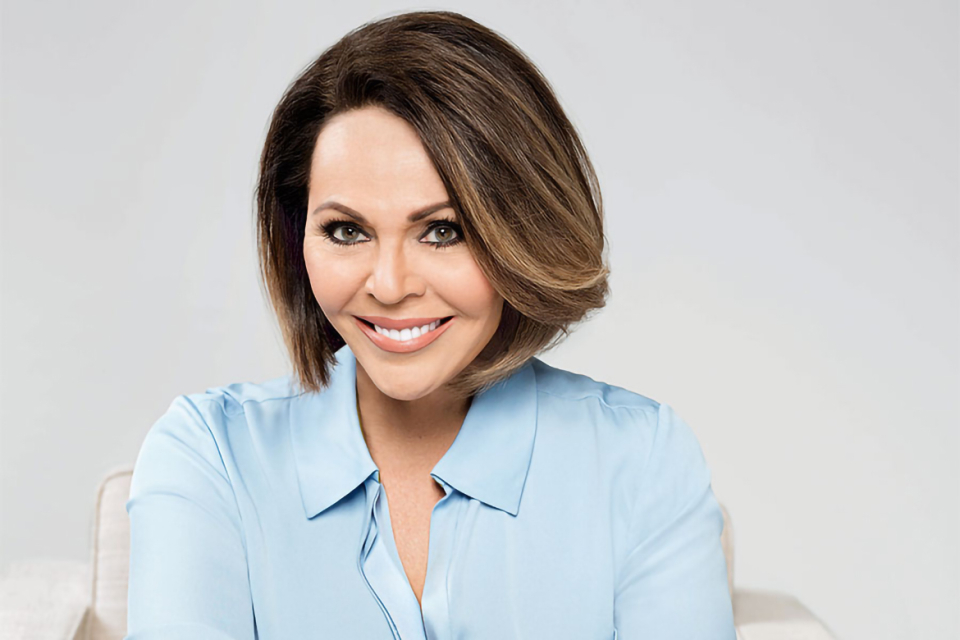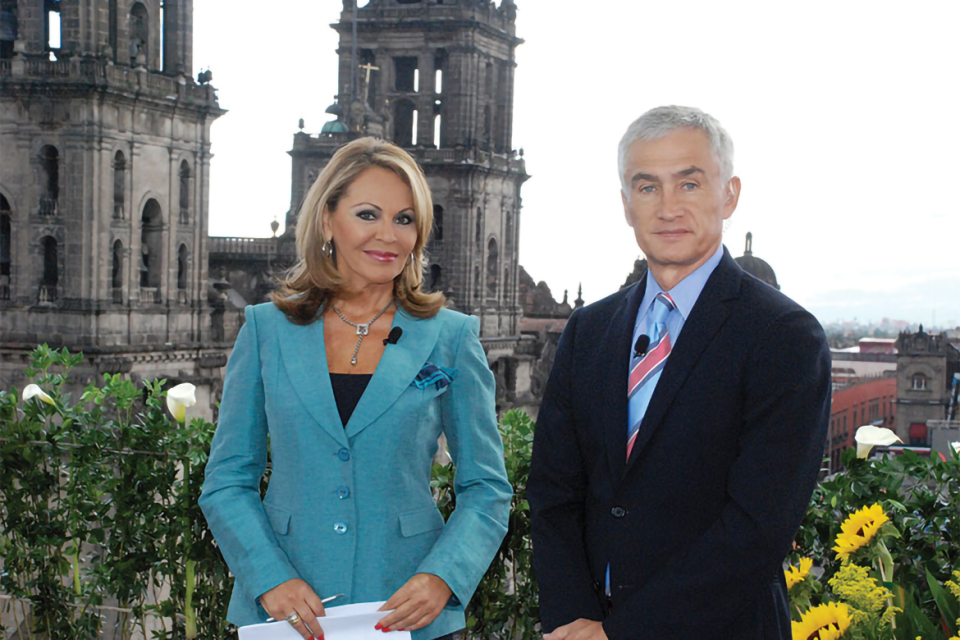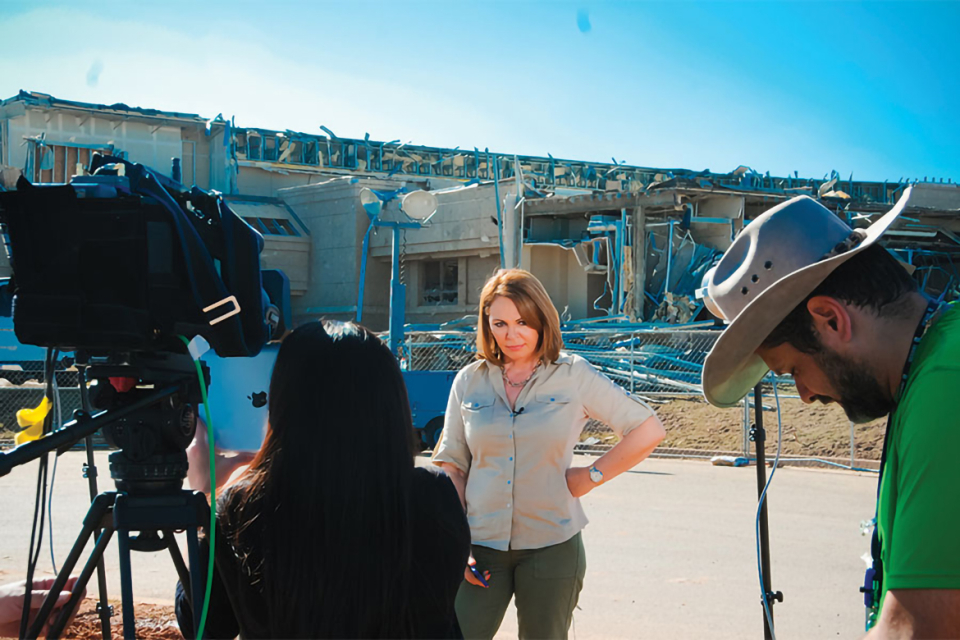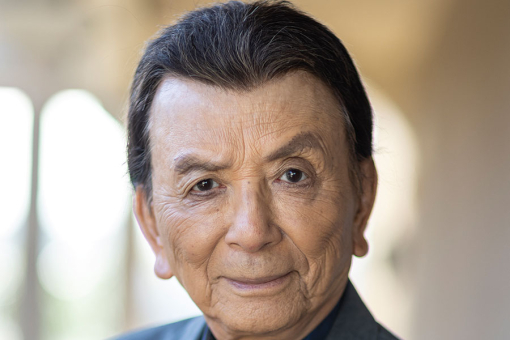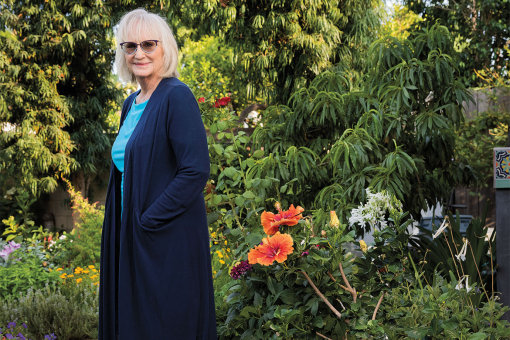It started with finding her voice; then Maria Elena Salinas found her mission.
A pioneering journalist, she has made a career advocating for her community and has won many awards along the way.
Salinas started in television as a reporter, and early on she realized that her heritage — she was born in Los Angeles to parents who had emigrated from Mexico in the 1940s — gave her an important perspective and responsibility. “My mission became the political empowerment of the Latino community,” she says.
As host of the premier nightly news program on Univision and the newsmagazine Aquí y Ahora (Here and Now), Salinas was a witness to history, reporting on wars, natural disasters and important social and political issues such as immigration.
She has won six Emmys, and in 2012 she and coanchor Jorge Ramos were honored with Lifetime Achievement Emmys from the New York–based National Academy of Television Arts and Sciences. In 2014 she received a Peabody Award and, three years later, was inducted into the National Association of Broadcasters’ Hall of Fame.
Though last year she ended her 36 year run at Univision — where she became the longest-running female network anchor in the U.S. — Salinas isn’t hanging up her press pass just yet. Her series The Real Story with Maria Elena Salinas, which airs Mondays on Investigation Discovery, recently returned for its second season.
Salinas was interviewed in May 2015 by director Jenni Matz for The Interviews: An Oral History of Television, a program of the Television Academy Foundation. The following is an edited excerpt of their conversation. The entire discussion can be screened at TelevisionAcademy.com/Interviews.
Q: What were your interests growing up?
A: Like so many young girls I wanted to be everything: a dancer, a nurse. My mother was a seamstress and she made all our clothes, so I wanted to follow in her footsteps.
Then I got interested in the marketing side of the fashion industry, and I went to a community college to study marketing and merchandising. When I did get a job in television, I thought it was an opportunity to go into sales and advertising instead of being on camera.
But ever since I was a teenager, I was always involved with community organizations as a volunteer. One thing led to another, and eventually I did some public speaking at some of these events and fundraisers for the Hispanic community. And then I worked in radio for a couple of years.
Q: You were a deejay — how did that come about?
A: I worked in Spanish-language radio and I was a deejay; I played music. At the same time, I did rip-and-read news. For those who don’t know, there used to be a machine that would pop out paper, and that’s where you had the news. We didn’t have little devices where we could read it.
Then an opportunity came up at Channel 34 [KMEX, the L.A. affiliate of the Spanish International Network, or SIN] for a host of a public-affairs program, Los Angeles Ahora. Along with this job came reporting and anchoring, something that I had never done before.
Being the perfectionist that I am, I said, “I have to do this right, because that’s what my mother taught me.” Whatever it is that you’re going to do in life, try to be the best at it. So I went back to school. I went to UCLA and took broadcast journalism courses, but you learn so much more on the job.
It took a year for me to raise my hand and ask a question, because I was embarrassed that I would ask the wrong question. I would see people around me — Paula Zahn was a reporter at the time and so many other reporters who are now working at a network level — and I thought, “That’s the question that I would have asked.” Or, “I want to ask this, but maybe it’s dumb.” Then someone else would ask it.
Eventually, I got over the fear and began to embrace it.
Q: Did anything change for you when Pete Moraga came on as news director?
A: One of my most impactful lessons from Pete Moraga came when I was covering politics. Hispanics were then 25 percent of the population in Los Angeles. There came an election, and a couple of Latinos were running for office.
To us, it was a major development, and we went out to do man-on-the-street interviews. I was very surprised that out of maybe 16 people that I interviewed, 15 weren’t voting. Either they didn’t know about the election, they were not registered to vote or they weren’t qualified.
I went back to Pete and said, “I can’t do this story. No one is voting from the people that I interviewed.” He said, “Well, there’s your story. People are not voting because they feel disenfranchised. They feel like they are not part of mainstream America.”
That had such an impact on me. Not only did it teach me more about journalism, it taught me about what my role should be — and would be — in Spanish- language media. At that moment, my mission became the political empowerment of the Latino community.
Q: Let’s talk about moving to the national level. You were first offered a job to anchor for the Hispanic Broadcasting Corporation, but instead you stayed with SIN, though on the network level.
A: I was offered a job starting a network newscast on Telemundo through an independent production company, HBC. That was a difficult decision for me. The job meant moving to Miami, and I didn’t think that I was ready to make that move.
But I finally accepted and when I went to resign, they said, “Give us a day so that we can make you a proposition.” That’s when they offered me the late-night newscast on the [SIN] network.
Q: Did you feel prepared to become a national anchor?
A: I had worked indirectly with the network as a reporter, and I had done several entertainment programs at the network level. So I kind of did, but I realized that it was very different.
People don’t always realize the impact of working in local news. You have a very direct communication with your community. When you move to the network level, especially in Spanish-language media, it’s a whole new thing because there are people you don’t know, communities you don’t understand.
I did not feel connected, for example, with the Puerto Rican community in New York or the Cuban-American community in Miami. I was very much connected with the mostly Mexican-American community in Los Angeles and the issues that affected Los Angeles.
I knew that [anchoring] was not just sitting there reading the news. It was a real commitment. And that mission I had of empowering the Latino community would now be nationwide, so it was necessary for me to understand this vast community.
Q: You’ve written in your autobiography [Yo Soy la Hija de mi Padre , or I Am My Father’s Daughter] about reporting on stories where you’re witnessing great human devastation and balancing your emotional response. What are the challenges in situations like that?
A: Natural disasters are some of the most compelling stories that we cover, because we focus so much on the human element in those stories, not just the politics and the logistics. In El Salvador, when an earthquake created a mudslide, I went to cover the story. I was following a man who had lost his kids and was desperately trying to find them.
I followed him for the first day and asked him, “What are you doing?” He said, “I’m digging, trying to find my children’s bodies.” The second day he said, “I want to make sure that their bodies aren’t mutilated and that they are complete before they come to pick them up.”
And on the third day, the man was wearing the same clothes. He hadn’t slept, he hadn’t eaten. He said, “All I want is to find a piece of my children.” We were there for hours. I kept telling my cameraman, “We really have to leave, we have to put this story together.” He was standing there with the little light on top of his camera and said, “We can’t leave. This is the only light they have.”
Then suddenly they said, “We found a body here.” The man we’d been following went and came back, carrying something. He said, “I found my daughter’s foot.” I asked, “How do you know it’s your daughter’s foot?” He said, “As parents, we know our kids’ feet.”
My youngest daughter was a year old at the time. And I remember telling her, “You have the prettiest feet in the world.” And I knew that if you put a lineup of feet of one-year-olds, I would recognize my daughter’s foot.
We went back to work, to the bureau in El Salvador, and my cameraman, soundman and producer, we wouldn’t speak — we couldn’t. For a long time, it affected us emotionally. You come back to your home, your family, your air-conditioned house…. You go home and you’re going to hug your daughter.
Q: Why was it important for you to go to Baghdad during the Iraq War?
A: It was an important story internationally. I went there, not as a Hispanic journalist or working for Spanish-language media, but as a journalist, period.
Now there was a difference between our coverage and the coverage of the general market. Whenever I say “general market” or “mainstream media,” I mean English-language media. It’s funny, because sometimes when we talk about mainstream media, I think, “Well, aren’t we mainstream, too? Is it us and them?” That’s a philosophical situation.
There was a lot of criticism of our coverage because we’re used to doing balanced coverage. English-language media, at a time of war, focuses on covering whatever the U.S. Army says, whatever the government says. We would also give the side of Al Jazeera, so we did get a lot of criticism and threats for that. But that’s what we’re used to doing. We give the other side.
Q: You had an interesting interview in 1994 with then–California Governor Pete Wilson, and again in 1996. You pressed him on immigration.
A: Pete Wilson originated this anti-immigrant wave in the country. I’m from California, so I can tell you, we’re trendsetters, but not always for positive things. In this case, he had a very nasty campaign that was targeting immigrants.
So when I interviewed him, I pressed him on that. He was a grandson of immigrants himself, and he did not appreciate my asking him what his immigrant grandparents would say about his campaign advertising. He got a little bit upset, took the microphone off and said, “I have to go now.”
Proposition 187 [a state initiative passed in California in 1994 and later found unconstitutional by a federal court] limited any kind of government services for undocumented immigrants — I think that was the first anti-immigrant law that really had an impact. So many years have gone by, and those issues still come up in political debates.
We need to ask those types of questions of politicians. A lot of them have this anti-immigrant stand as an agenda.
Our coverage on this issue, I think, is what began to earn us this reputation for advocacy journalism. The image of the community goes in cycles, up and down, and that was one of those down times, when immigrants — not only undocumented — were accused of all the ills of this country.
That’s one of the reasons we decided that we need to speak up for them. If they can’t ask the questions, then we need to ask those questions for them.
So when we are accused of advocacy journalism, I always say that we’re contributing to a debate in this country. Otherwise it’s a monologue. We need to explain to our audience, and to a larger audience, that immigrants are here to contribute, that they’re here in search of a better life for themselves and their families… but they also want to be part of society.
That’s why we give them a voice and why we advocate for them.
Q: Univision did not always have a place in the presidential debates, but in 2007 you were one of the hosts of the first Democratic and Republican presidential candidate forums in Spanish.
A: We actually did one before that, a coproduction with PBS. We did it in Arizona and it was only Democrats at the time, but I think they began to realize the importance of Spanish-language media.
When I started working at KMEX and covered politics, it wasn’t easy, especially when I began to cover national elections. I remember trying to get an interview and they would say, “Who? Where are you from? Maybe you can find a translator.” I said, “No, I can do the interview in English. We can translate it ourselves.”
It was insulting for us to have to explain who we were and why they should give us an interview. But that has changed tremendously. It has changed because I think we’ve grown hand-in-hand. The Hispanic community has grown with Spanish-language media, especially Univision, and we’ve played a pretty important role in that.
Not only because we provide information in their language, but we talk about the issues that affect them. Now you see such a major change. Every major campaign will have someone on their staff who deals with Spanish-language media or Hispanic issues. And that just goes to show the importance of the Hispanic community, and the Spanish-language media, to reach that Hispanic community.
Q: What has been the most important interview of your career to date?
A: There have been a lot of very important interviews. But some of my interviews with President Obama — and I’ve had an opportunity to interview him several times — have been of substance.
Of all of the politicians I’ve interviewed, President Obama is one of the few who actually answers the question, even if he then goes off to his own prepared remarks. At least he listens to your question and answers it. You don’t always like the answer, so you have to follow up on that.
Q: You have been called “the most recognized and trusted Hispanic newswoman in America.”
A: That’s an honor.
Q: What do you consider your biggest responsibility in that role?
A: You need to keep things in perspective and you need to understand why you’re here. I’m not here to be a TV star. I’m here to be representative of our people. I’m here to communicate. The mission that I set out for myself back in the early ’80s, when I started working at KMEX, is one that I want to follow all the way through.
And if people watch me and listen to me and believe me, it’s because they have seen my commitment. They’ve seen me out on the street, not just sitting and reading news. I cover the stories and tell the stories that need to be told. That’s how you gain trust. I don’t think you can fake it. The lens doesn’t lie.
Q: Have there been specific challenges as a female anchor?
A: Along the way, there have. Even though we have advanced in many ways, in journalism we’re still lagging behind. Women still have to work twice as hard to receive half of the recognition that men do. And maybe, as a Hispanic woman, I have to work three times as hard to get one-third of the recognition that men do.
But the good news is that we can. We have that ability to multitask.
There have been challenges within my newsroom and challenges covering a story. There’ve been times when I haven’t been sent to the Middle East because I’m a woman and times I have gotten an interview because I’m a woman.
But I go back to my childhood and what I learned from my mother — that work ethic, not allowing myself to be mediocre and not allowing myself to be a conformist. That has helped me to say, “Okay, I find myself being discriminated against. I’m going to step up to the challenge, raise my hand and say, ‘I’m here and I can do the job just as well as a man can.’” And then show it by my work.
Q: Does television today represent the diversity in this country?
A: It is beginning to show that diversity. We see more and more Hispanics on the air. There are not enough of them, but little by little they’re being recognized. They’re not only covering Hispanic issues, but any issues. But there’s still a long way to go.
One positive sign is that for many years we at Univision — and maybe Telemundo and some of the other Hispanic media outlets — were the only ones who talked about the Hispanic vote. Now mainstream media also focus on the Hispanic vote.
They’re not yet giving us the importance that we deserve, but even a mere mention of the Hispanic vote in mainstream media is so important. It makes me feel like all of this work that we’ve done all these years has paid off.
This article originally appeared in emmy magazine, Issue No. 7, 2018

